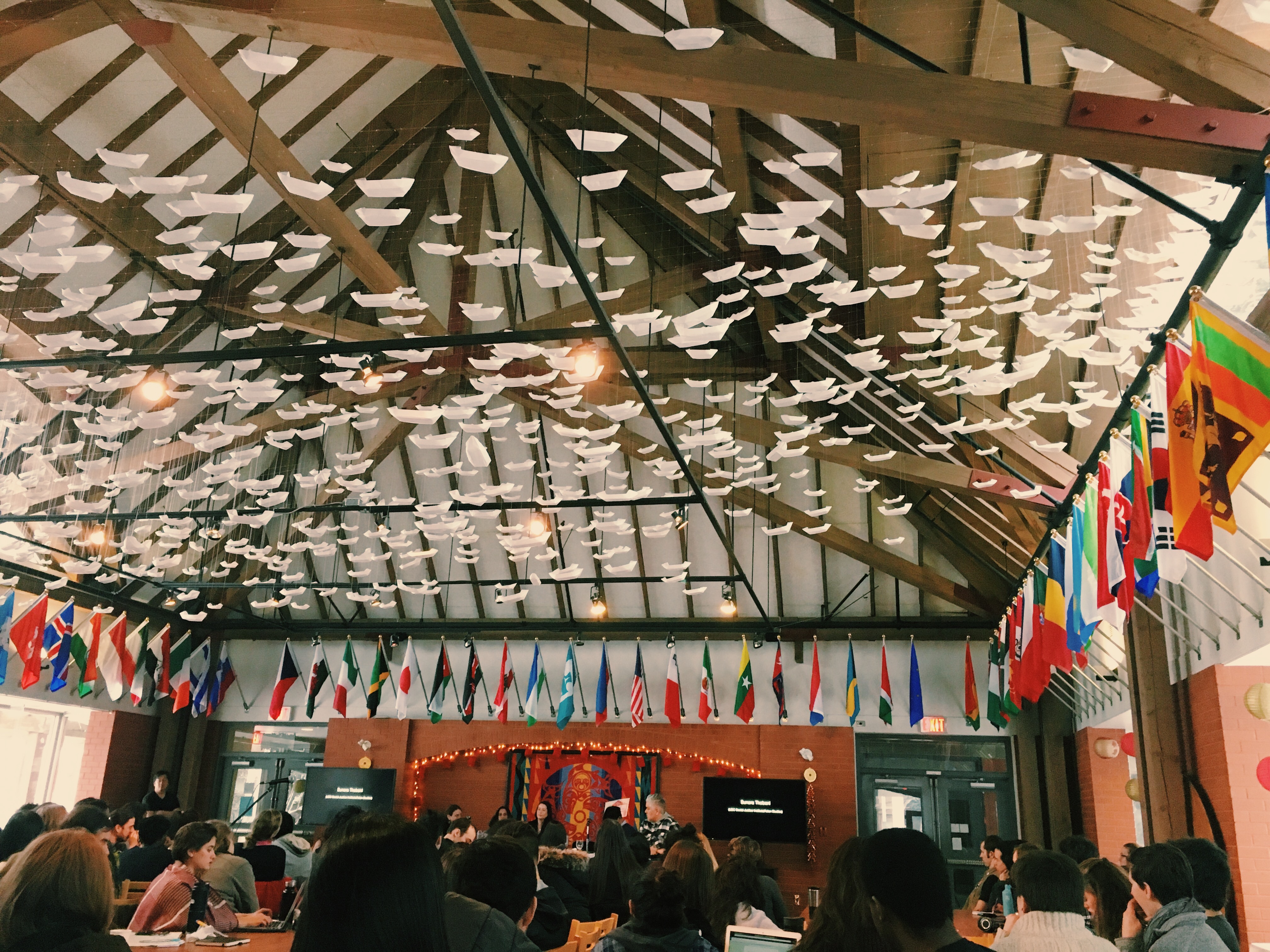Social Concepts of Citizenship and Border Entry: The Muslim Ban
The discussion of nation and citizenship has been ongoing in media outlets and scholarly discourse over the course of the past few weeks. This is primarily due to President Donald Trump’s executive order on immigration that has resultantly caused not only national turmoil, but also distressed and indignant responses from other nations globally. Protests and rallies comprise much of these responses, but other events include open dialogue. Pictured above is a public discussion that was held in St. John’s College on UBC campus titled “Ban the Ban.” This was an immediate response that was curated by UBC faculty members in order to address the ban of people coming from the seven Muslim majority nations to the United States. The space that was offered by St. John’s College enabled a productive and knowledgable conversation amongst the UBC community particularly due to the symbolic environment that it was held in. Pictured in the photograph are flags from countries around the world as well as others, such as one of the Musqueam people and the LGBTQ+ pride flag. This is illustrative of UBC’s national and international relationships, as well as the institution’s values of inclusivity and diversity. The art installation on the ceiling is also notable as it showcases over a thousand paper boats. The representation of migration and seeking refuge by crossing water is an important component in the discussion that took place regarding the ban.
Speakers on the panel came from various ethnic backgrounds and therefore exhibited different reactions to Trump’s ban. Glen Coulthard, whom is an associate professor in the First Nations and Indigenous Studies program at UBC, is apart of the Yellowknives Dene First Nation and his stance on the ban originates from his people’s historical displacement and experience with settler colonialism. His talk provoked discourse on citizenship, and what exactly constitutes belonging within a nation. The concept of nationhood and citizenship is created from a xenophobic ideology that dominated Trump’s campaign. University of California Professor Rogers Brubaker explains that, “nationhood is not an ethnodemographic or ethnocultural fact, it is a political claim,” and this political claim that is held very strongly by many of Trump’s supporters surrounds the idea that Muslim people cannot be Americans and should not be allowed within its borders. This politicized rhetoric of whom is able to be a citizen and whom is not is based on historical inequality that Coulthard touched upon.
Coulthard discussed how America was traditionally Indigenous territory and therefore it is difficult for him to see that others are now regulating who is welcome on native land and who is not. The claim to American land by President Trump and his administration supports the idea of a nation as an imagined geographical region that enables the social construction of granted citizenship and entry within imagined borders. Sherene Razack explains in her book Race, Space, and the Law, that this erases the history of violence in conquest, and the role of Indigenous people in nation building. It is evident from the Muslim ban that the violence and social differentiation that was used in the process of building America into a nation, is once again being used. This time, however, a different racialized group is being subjected to it. Rather than Indigenous people being the sole target, Muslims are. Because of this, the executive order is not just a product of Trump’s spread of racist rhetoric. White nationalism from Europe produced a long standing racial hierarchy that founded America and therefore Trump’s immigration ban from Muslim majority states was resultantly built upon this.
Settler colonial ideologies that have been implemented into modern day rhetoric have shaped our concept of nation and citizenship and this can be seen in Trump’s executive order. To prevent widespread hatred and further prejudice against black and brown bodies, open dialogue can be used to spread awareness of the history of this already performed violence. Solidarity with Muslim people during this time of crisis is especially needed in order to illustrate resistance and tenacity against the current violence being performed.
Works Cited
Brubaker, Rogers. “In the Name of the NNation: Reflections on Nationalism and Patriotism.” Citizenship Studies. 2nd ed. Vol. 8. N.p.: Carfax, 2004. 115-27. Web.
Razack, Sherene. “When Place Becomes Race.” Race, Space, and the Law: Unmapping a White Settler Society. Toronto: Between the Lines, 2002. 1-20. Web.
